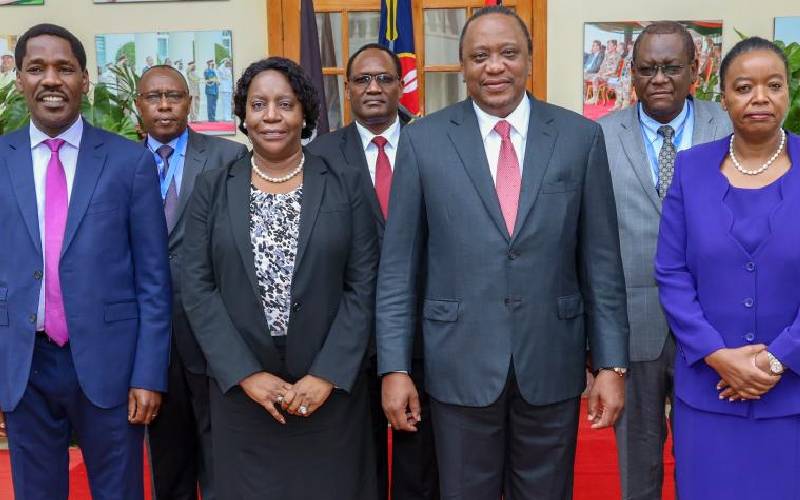Kenya ramps up economic diplomacy to boost exports
Financial Standard
By
Frankline Sunday
| Dec 28, 2021

President Uhuru Kenyatta with Ms Chileshe Mpundu Kapwepwe, Secretary General Common Market for Eastern and Southern Africa (COMESA) who called on him at State House.
More than 250 Kenyan investors trooped to the Democratic Republic of Congo (DRC) earlier this month for a two-week visit to scout for opportunities, highlighting the country’s new economic diplomacy drive.
Organised under the stewardship of the two governments and facilitated by the Equity Group, the trade mission took the Kenyan investors through Kinshasa, Lubumbashi, Goma and Mbuji-Mayi.
It is Kenya’s latest push in its economic diplomacy agenda across the region as it seeks to secure a foothold within the East African Community (EAC).
READ MORE
NHC to develop 2,820 affordable houses through public-private partnership
Kenyan investors urged to tap into China's tech and industrial expertise
Maersk boosts maritime field with training for 10 cadets
PS: Vision 2030 to drive Kenya's ICT sustainability agenda
More women defy traditions to lead in land purchases
Stanbic set for record dividend payout as net profit hits Sh13.7b
Sh5,000 deposit for Sh10.5m house: The rot in Kuscco Kajiado project
China pledges to expand Kenya's SGR to Malaba
Private power producers, State agency in Sh4.2b tender dispute
Women volunteers rewrite history through digital knowledge campaigns
“The vision is of commercial diplomacy,” explained Cabinet Assistant Secretary to the Ministry of Industrialisation, Trade and Enterprise Development Lawrence Karanja.
“We are no longer engaged in the traditional political diplomacy, but what were are looking at here is everywhere we have a vision, what are Kenyans going to get from there? As the government, our main role is to facilitate trade and industrialisation, but the real people to do that work are the private sect,” he added.
DRC is set to join the EAC, a move that is expected to expand Kenya’s regional consumer market, riding on Congo’s more than 100 million residents, a majority of whom are below the age of 25 years.
Equity Group Chief Executive James Mwangi said Kenya’s economic sectors have diversified and matured to the level of exporting both goods and services into regional economies.
“There is a commitment that where our country is now, it can only be transformed by the private sector, and this requires doors to be opened through bilateral agreements with friendly countries so that our goods and services can find it easy to make headway,” he explained.
According to Mr Mwangi, Kenya’s transformation into a regional financial hub as well as investments in telecommunications, healthcare and education have made the country a services export hub.
Covid-19 has also led to a disruption in the global supply chain, meaning African countries that rely on imports from the US and European markets have had to cover the shortfall with local supplies.
Joss Dijimba, founder and CEO of Dijimba, a company that produces packaging materials said the pandemic has underlined the risk of relying on foreign direct investment from the West.
“It feels good to have African investors come to African countries to invest because we are used to people from outside the continent coming in, but oftentimes, they do not know the nuances of the local markets,” said Mr Dijimba.
Another factor that has spurred Kenya’s latest regional diplomacy drive is the African Continental Free Trade Area (AfCFTA). The trade pact aims to establish Africa’s largest free trade area, which will eliminate barriers for the more than 800 million consumers from Cape Town to Cairo. Kenya was the second country to ratify the agreement and its strategic position in the East African region has given Nairobi fresh impetus to expand its economic agenda.
Robert Mudida, a researcher at the Central Bank of Kenya, said the current trends of economic diplomacy in developing countries have been spurred by the failure of previous approaches to yield fruit.
According to Prof Mudida, the current push, such as Kenya’s, stems from the need to install development that is characterised by growth plus change.
Previous attempts that have focused too much on physical capital at the expense of human capital, as well as government policies dictated by the aid conditions from the Breton Woods institutions, have both fallen short of addressing the challenge.
“Neither the first nor second generation of development thought delivered any real value to African states,” he explained. Kenya’s leading telecommunications operator Safaricom is part of a consortium set to launch commercial operations in Ethiopia in a few months’ time after the Ethiopian government awarded the telco the country’s second mobile operating licence.
The current licence, however, is only for communication services and does not include mobile money following a moratorium by the Ethiopian government barring foreign companies from operating mobile money services.
Safaricom is expecting to spend between Sh166 billion and Sh222 billion in capital investment in Ethiopia in the next five years and plans to recruit 1,000 employees next year, including 150 graduates.
And a week before the Kenya-DRC trade mission President Uhuru Kenyatta was in South Africa to open a business forum between the Kenya National Chamber of Commerce and Industry and the South African Chamber of Commerce and Industry.
The one-day forum pushed for the elimination of trade barriers between the two countries.

